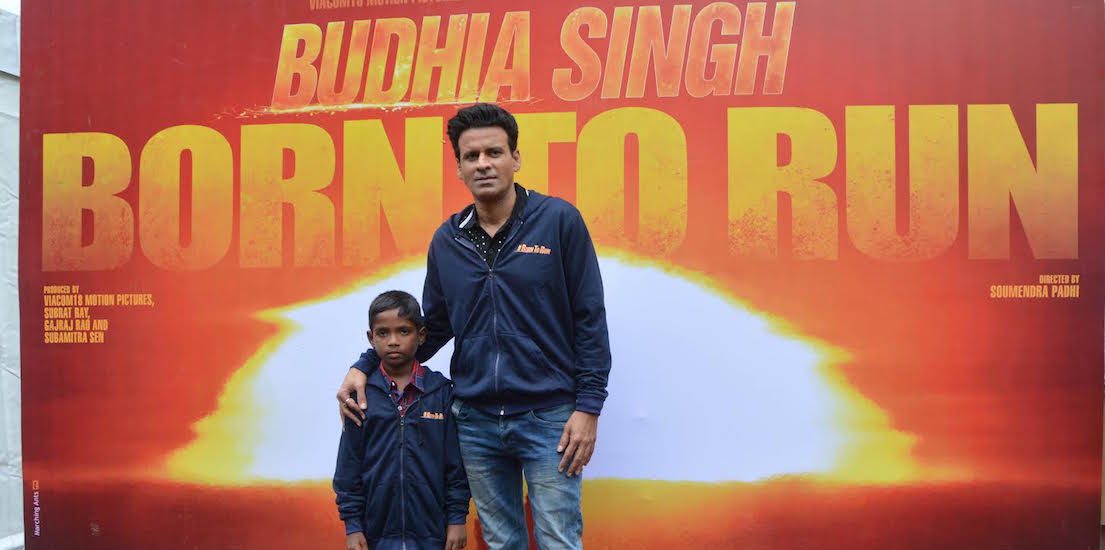I would act like the coach even when we were off camera – Manoj
Manoj Bajpayee has been a part of Indian cinema for more than two decades and has always broken new grounds in his movies. After moving audiences with his performance as Professor Siras in Aligarh, the actor will now be seen in Soumendra Padhi’s biographical sports film, Budhia Singh – Born to Run.
The film that is based on Budhia Singh, the five-year-old prodigy who ran 48 marathons, features Bajpayee as coach Biranchi Das who was instrumental in mentoring and nurturing the young boy. In a conversation with Pandolin, Bajpayee who perceives himself to be a critically acclaimed actor as opposed to a commercial one, talks about the movie, his character, and his dynamics with his child co-star along with his opinions on how film content has undergone a huge change.

Manoj Bajpayee as coach Biranchi Das
Tell us about the character of Biranchi Das and what motivated you to play it?
Biranchi Das used to try and help underprivileged children to realize their talent. That was one of the things that I liked about the character; this quality of encouraging children and helping them to get ahead in their life is a commendable thing to do. He would also help them to find employment. The story shows how Das came across Budhia Singh and helped the child. Unfortunately, the authorities and society started questioning his intentions and in turn created a hindrance, eventually taking the child away from him. The film shows the way in which our society thinks and touches upon many other issues.
READ: 5 UNKNOWN FACTS ABOUT THE FILM ‘BUDHIA SINGH – BORN TO RUN’
Like you mentioned, there were accusations and allegations against Biranchi Das, so what kind of an image are you portraying in the film?
If you look from my perspective, Das is a very positive character because he helped underprivileged children. Therefore, how can he be negative? He was accused of a lot of things, but then again, even Gods are not spared of allegations; Lord Krishna was also accused of a lot of things. Das and the authorities had a lot of issues. He wasn’t afraid of telling the truth about the authorities or standing up to them. A lot of allegations did come his way, but I don’t think that he is a negative character.
The film shows the way in which our society thinks and touches upon many other issues
How was the experience of playing this character different from your past roles?
This is a different kind of character and I prepared for it in a different manner. Since this character actually existed, there were characteristics and elements that I needed to be aware about and I have worked on that. We have tried to show him in the way that he was in real life. A lot of people knew him and there were various opinions about him. We gathered all that information and then tried building the character as close as possible to Das’ real self.
READ: I’M INTO THE BUSINESS OF STORYTELLING – MANOJ BAJPAYEE
How did you understand Das and pick up his characteristics?
Today information has become very accessible because of the Internet. So, there was too much research material available. There are numerous channels that have covered him as well. I was aware about him and had seen him on a lot of news channels. I also saw a lot of his interviews to get to know him better. Plus, there are around 5-6 documentaries that have been made on Biranchi Das and I have seen each of them. All this helped me understand him as a character and bring his characteristics on screen.
We gathered all the information and then tried building the character as close as possible to Das’ real self

With Director Soumendra Padhi (Right)
In terms of acting and chemistry, how was the equation between your child co-star Master Mayur and you? Were there any challenging moments?
There were no difficulties as such. He is a very disciplined child. We had done a workshop with him along with the other children and lead actors. He has also undergone extensive training for the movie. Mayur remembered his lines and acted the scenes out properly and has done a wonderful job. He is a child but there were no tantrums or any other difficulties.
As for the equation (between us), I would stay quiet around him because I didn’t want our on camera interaction to be affected by the way I was with him off camera. Since he is a child, there were chances that the casualness that is shared off-camera could confuse him while he is playing the character. I wanted him to behave in the way that Budhia Singh would behave with Biranchi Das. In fact, I would act like the coach even when we were off-camera, so that it didn’t confuse him.
Can you describe the relationship that Biranchi Das and Budhia Singh share in the movie?
Biranchi Das was like a father figure for Budhia Singh. He is the child’s guide, mentor and coach. Das has all the qualities of a father, he loves the child like a father would, but disciplines the child like a coach would. Das puts in a lot of effort to bring out and encourage the child’s talent. So they have a father-son relationship along with sharing a mentor-student relationship.
I would stay quiet around him because I didn’t want our on camera interaction to be affected by the way I was with him off camera
Since you play a coach, did you have to undergo intensive physical training?
I did not have to make six-pack abs for the film. Therefore, for me, the training wasn’t intense I had to build my body, but yes, I needed to look fit. In terms of physical training, I usually run around 10 km every morning.
Most of the time, I have to train or prepare myself at an emotional and mental level. I work on the character’s mental and emotional state because that is extremely important and that takes time. Reading the script and gathering all the elements, and then getting all those elements on screen, takes a lot of effort. Hence, that is where the real training comes in for me.
READ: PANDOLIN DIALOGUES – MANOJ BAJPAYEE & ABHAYANAND SINGH

In a still from Budhia Singh Born To Run
You’ve been part of the industry for over two decades now. How has the content of movies evolved?
It has improved a lot and I think it will keep improving. The only condition being that we give scriptwriters more freedom and importance. We have to encourage them in order to create good content. And movies with good content need to be supported by corporates and producers, which will ultimately give birth to new ideas that can be developed into excellent movies. If this support is not given, this movement, this phase will end sooner than it should.
READ: THIS IS A GOOD TIME TO GET INTO SCREENWRITING – GAURAV PATKI
You have portrayed real as well as fictitious characters. Would you say that playing one is easier than the other?
Every character is difficult to portray, whether it is a biopic or not, whether it is imaginative or based on a real person, all of it is difficult. Acting is the most difficult job in the world and good acting is even more difficult. You need to put in a lot of effort, you need to concentrate and stay focused in order to understand the character. Hence, whether you are playing a fictional or a real character, at the end of the day you need to put in the same amount of dedication and focus for each and every character.
Acting is the most difficult job in the world and good acting is even more difficult
Do numbers and box office collections affect you as an actor?
My career spans over 22 years and I’ve had just five or six films that were commercial hits. I am an actor of flop films, but I am surviving, therefore, I must have done something right. Most of my films are acclaimed films and acclaimed films are not necessarily hit films. I am an actor of acclaimed films! I don’t know if that is unfortunate or not, the thing that matters to me is that I am still working and more importantly, I am doing films that I want to do. And I have gained a lot of respect in this industry because of my work.



